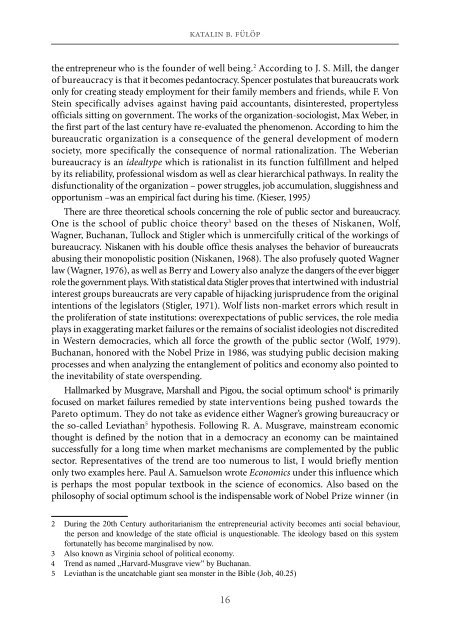ACTA SZEKSZARDIENSIUM - Pécsi Tudományegyetem Illyés Gyula ...
ACTA SZEKSZARDIENSIUM - Pécsi Tudományegyetem Illyés Gyula ...
ACTA SZEKSZARDIENSIUM - Pécsi Tudományegyetem Illyés Gyula ...
You also want an ePaper? Increase the reach of your titles
YUMPU automatically turns print PDFs into web optimized ePapers that Google loves.
katalin b. fülöp<br />
the entrepreneur who is the founder of well being. 2 According to J. S. Mill, the danger<br />
of bureaucracy is that it becomes pedantocracy. Spencer postulates that bureaucrats work<br />
only for creating steady employment for their family members and friends, while F. Von<br />
Stein specifically advises against having paid accou ntants, dis intere sted, propertyless<br />
officials sitting on government. The works of the organi zation-sociologist, Max Weber, in<br />
the first part of the last century have re-evaluated the phenomenon. According to him the<br />
bureaucratic organization is a consequence of the general development of modern<br />
society, more specifically the consequence of normal rationalization. The Weberian<br />
bureaucracy is an idealtype which is ratio nalist in its function fulfillment and helped<br />
by its reliability, professional wisdom as well as clear hierarchical pathways. In reality the<br />
disfunctionality of the organization – power struggles, job accumulation, sluggishness and<br />
opportunism –was an empirical fact during his time. (Kieser, 1995)<br />
There are three theoretical schools concerning the role of public sector and bureaucracy.<br />
One is the school of public choice theory 3 based on the theses of Niskanen, Wolf,<br />
Wagner, Buchanan, Tullock and Stigler which is unmercifully critical of the workings of<br />
bureaucracy. Niskanen with his double office thesis analyses the behavior of burea ucr ats<br />
abusing their monopolistic position (Niskanen, 1968). The also profusely quoted Wagner<br />
law (Wagner, 1976), as well as Berry and Lowery also analyze the dangers of the ever bigger<br />
role the government plays. With statistical data Stigler proves that intertwined with industrial<br />
interest groups bureaucrats are very capable of hijacking jurisprudence from the original<br />
intentions of the legislators (Stigler, 1971). Wolf lists non-market errors which result in<br />
the proliferation of state institutions: overexpectations of public services, the role media<br />
plays in exaggerating market failures or the remains of socialist ideologies not discredited<br />
in Western democracies, which all force the growth of the public sector (Wolf, 1979).<br />
Buchanan, honored with the Nobel Prize in 1986, was studying public decision making<br />
processes and when analyzing the entanglement of politics and economy also pointed to<br />
the inevitability of state overspending.<br />
Hallmarked by Musgrave, Marshall and Pigou, the social optimum school 4 is prima rily<br />
focused on market failures remedied by state interventions being pushed towards the<br />
Pareto optimum. They do not take as evidence either Wagner’s growing bureaucracy or<br />
the so-called Leviathan 5 hypothesis. Following R. A. Musgrave, mainstream economic<br />
thought is defined by the notion that in a democracy an economy can be maintained<br />
successfully for a long time when market mechanisms are complemented by the public<br />
sector. Representatives of the trend are too numerous to list, I would briefly mention<br />
only two examples here. Paul A. Samuelson wrote Economics under this influence which<br />
is perhaps the most popular textbook in the science of economics. Also based on the<br />
philosophy of social optimum school is the indispensable work of Nobel Prize winner (in<br />
2 During the 20th Century authoritarianism the entrepreneurial activity becomes anti social behaviour,<br />
the person and knowledge of the state official is unquestionable. The ideology based on this system<br />
fortunatelly has become marginalised by now.<br />
3 Also known as Virginia school of political economy.<br />
4 Trend as named „Harvard-Musgrave view” by Buchanan.<br />
5 Leviathan is the uncatchable giant sea monster in the Bible (Job, 40.25)<br />
16




